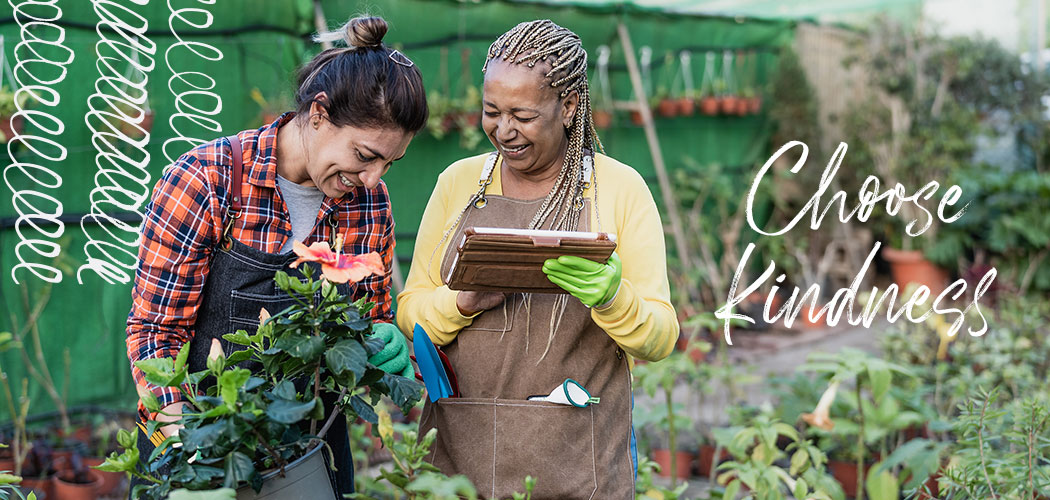In today’s world, people and families face a myriad of stressful situations, both external and internal. It might not seem possible, but something as basic as kindness can actually make a difference. Kindness can be a behavior, an act, or even a philosophy. And science shows, “kindness creates positive (supportive and meaningful) social connections, which, in turn, reduce the response to stressors as well as fulfill basic, innate needs that are critical to health and longevity.”
So, by that understanding, kindness can improve your health and wellness. We couldn’t agree more.
But, What is Kindness?
Kindness is a positive way to relate to others. It’s a behavior akin to altruism, generosity, and empathy. With kindness, there is often caring, gratitude, and compassion. Kindness is all about connection.
But, kindness isn’t about being nice, because “niceness” can be a way to avoid empathy. It’s like the difference between empathy and sympathy, according to Brené Brown, an author, researcher, lecturer, and Texan, who studies courage, vulnerability, shame, and empathy. In this video on the topic, Brown notes ways we can exercise true kindness, such as:
- “Perspective Taking or recognizing their perspective is their truth.” In other words, putting yourself in someone else’s shoes.
- “Staying out of judgment.”
- “Recognizing emotion in other people and communicating that. Empathy is feeling with people.”
Brown goes on to say empathy is a “vulnerable choice” to connect, whereas sympathy can be dismissive.
Choose Kindness (Even When It’s Hard)
It can be a challenge to choose kindness. Most of us wake up and are happy enough to simply choose coffee and wish we had another hour to hide under the covers. But we have families and responsibilities that demand our energy and attention. It can be hard to take the time for kindness, but the benefits can make the cost worthwhile.
A good way to start your day is being kind to yourself. That’s right. Make it a practice to ask yourself how you are feeling and what your needs are. Can you do one small thing to meet that need? Maybe it’s taking five minutes for your skincare routine, getting in 10 minutes to tone your abs, or perhaps you could do both and spend that 15 minutes thinking of the things you are most grateful for in your life.
As Hope said on Instagram, “Today, take note of the small moments you have that you could be extending, and NOT feel guilty; because self-care isn’t a waste; it’s an investment.”
Put Kindness into Action
When you can be kind to yourself, you have the capacity to be kinder to others. Learning about our own biases is a great way to build empathy and promote kindness.
This is one reason health and wellness advocate Hope Dworaczyk Smith supports the mission of The Conscious Kid, a nonprofit that works to educate and root out bias in early education. Parents and educators need to take a hard look at themselves and the way they guide the young minds around them, and The Conscious Kid has the materials to help them do just that.
- What to do: One way to practice kindness in action is by becoming an active bystander. If someone does or says something that makes you uncomfortable for another person in your space, see what you can safely, calmly do to help. Sometimes all that’s needed is a gentle reminder. You could say, “Oh, we don’t use that word. We use [this word], because it’s more descriptive.”
Another group Hope supports doing the work to make a better world is the group Unlikely Heroes, which advocates and educates to prevent human trafficking as well as working to help victims/survivors rebuild their lives. Children and adults who have been trafficked need our compassion. What happened to them was not their fault, but they are often stigmatized.
- What to do: It’s good to try to remember compassion, because survivors are all around you. They could be your co-worker, the barista, or even a friend. Frame responses to news about such things, if they come up, centering on the survivor. For example, a trafficking ring makes the news and someone brings it up at work, instead of centering a conversation around the perpetrators and their crimes, talk about the kinds of resources and support available to survivors. Maybe someone needs to hear that.
Hope and her family also support Together We Rise, a nonprofit run in part by former foster care youth, which aims to help kids currently in the system find their way. The group provides support for fun activities and educational opportunities that kids in foster care don’t always get to experience.
Here’s to all the people honing their kindness and contributing to the health and wellness of us all. And remember that you are important too. We want to end this blog with one of Hope’s affirmations.
“Repeat after me: I am improving each day. I celebrate life’s small and large successes.”
